FourFourTwo's 100 Greatest Footballers EVER: 90 to 81
A hot-headed Bulgarian, Argentina’s tractor and a Welshman who twisted blood for two decades in the second part of our countdown

90. Roberto Carlos
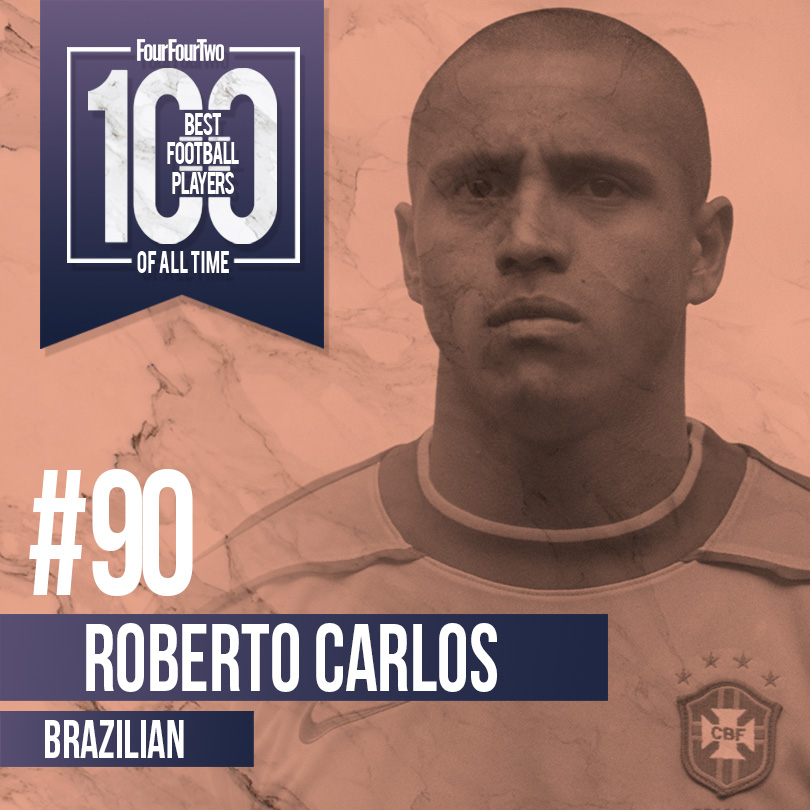
Why are they here?
The diminutive Brazilian spent 11 seasons flying down the left flank at the Bernabeu, helping Real Madrid to three Champions League titles.
His attacking ability originally earned him a call-up to the national team aged 18, when he was playing for Uniao Sao Joao. He followed that by joining one of Palmeiras’s best-ever teams and then Inter, before Real Madrid came calling. There he became a cult hero for carrying a smile almost as big as those monster thighs which allowed him to fire the ball towards goal at 105mph. No wonder goalkeepers (and fans in the stands) feared him.
Career highlight
The 2002 World Cup winner could defy the laws of physics. Striking the ball with his three outside toes, a free-kick that was apparently heading to the corner flag curved back and hit the net in a 1-1 draw against France at the 1997 Tournoi.
- Roberto Carlos: 'I was aiming for the ‘A’ in La Poste, but it went miles away from that!'
- At The End Of The Day: "I’ve slept in the same room as Ronaldo more times than with my wife"
Words: Marcus Alves
89. Hristo Stoichkov
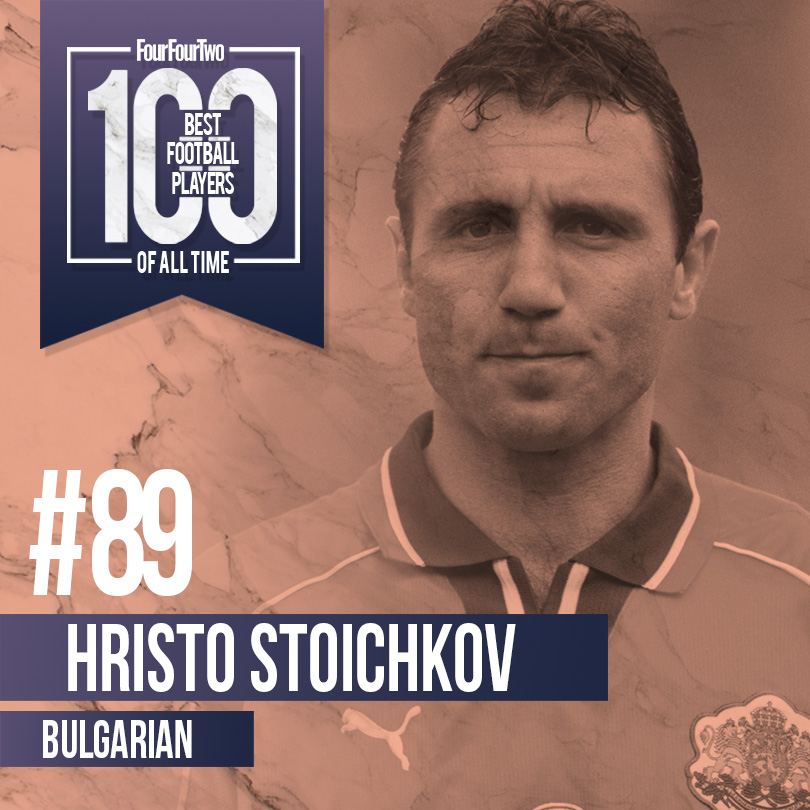
Why are they here?
A roving forward of glorious unpredictability, Stoichkov was a mainstay of Johan Cruyff’s ‘Dream Team’ Barcelona side that won four league titles on the trot - and the club’s first European Cup – in the early 1990s.
Get FourFourTwo Newsletter
The best features, fun and footballing quizzes, straight to your inbox every week.
The Bulgarian was famously improvisational and infamously hot-tempered (you can see why Cruyff took to him), and complemented his direct dribbling with a handy habit of catching goalkeepers off-guard with rocket-powered shots from unlikely distances.
Stoichkov turned in a similar level of performance for his national side, most notably at the 1994 World Cup. His six goals in the U.S. took Bulgaria to the semi-final and made him joint top-scorer of the tournament.
Career highlight
His frustratingly fleeting partnership with Romario during the 1993/94 season, the Dream Team’s fourth title campaign, which reaped 54 goals and will go down as one of the all-time great forward pairings.
- ACTION REPLAY The incredible adventures of Romario and Stoichkov in Barcelona
- Why Gheorghe Hagi is a footballing icon
Words: Alex Hess
88. Allan Simonsen (Denmark)
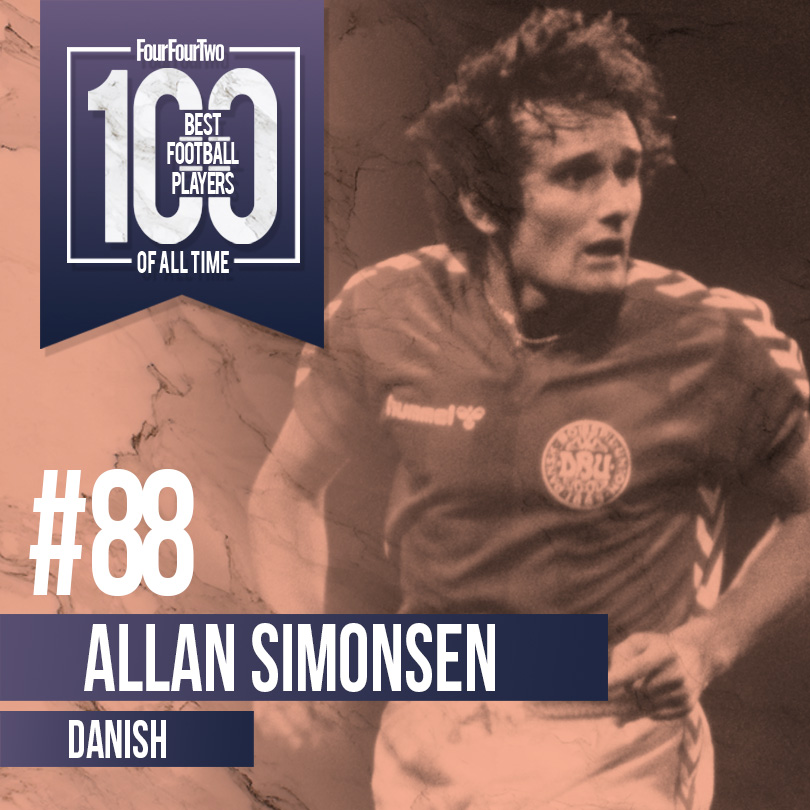
Why are they here?
A hard-working, fiercely committed centre-forward with a knack for important goals, Simonsen is recognised as one of the most important Danish footballers of all time and enjoyed a splendid three-year spell at Barcelona.
Yet his most impressive exploits came in Germany, where he helped Borussia Monchengladbach to three consecutive Bundesliga titles in the mid-'70s. He’s also the only footballer to have scored in the European Cup, UEFA Cup and Cup Winners' Cup finals.
Career highlight
Winning the Ballon d’Or in 1977, beating Kevin Keegan and Michel Platini in the process, and becoming the first Danish player to take the honour.
Words: Alex Hess
87. Javier Zanetti
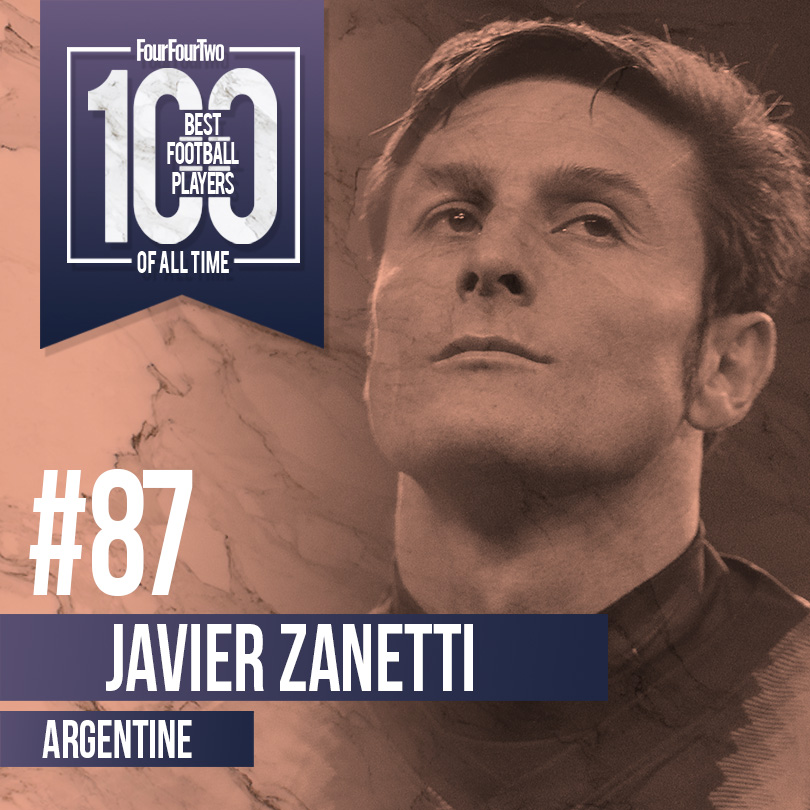
Why are they here?
Because if he's not the finest right-back the world has seen, he may have remained a world-class performer for longer than any other individual on this list.
During 19 years at Inter, which followed his early club career in Argentina and came amid some of the Milan side’s most volatile years, he made a club-record 858 appearances and won 16 trophies before retiring aged 40. The stamina and footballing brain that made him such an outstanding full-back were complemented by a technical ability that meant he also later excelled in midfield.
Career highlight
Captaining Inter to the Treble in 2010, which ended their 45-year wait to regain the European Cup.
Words: Dec Warrington
86. Gabriel Batistuta
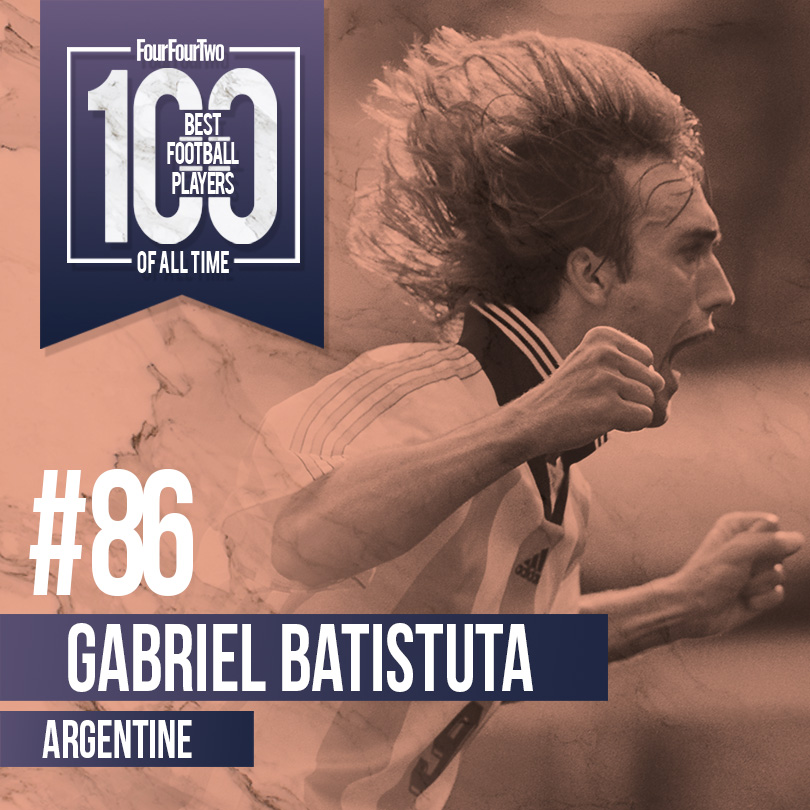
Why are they here?
Never has a man been able to kick a football with such murderous ferocity as Gabriel Batistuta. Batistuta was something of an Alan Shearer counterpart back in the '90s: both enjoyed coinciding heydays, and were no-frills, all-round centre-forwards who enjoyed nothing more than bludgeoning the ball into the net from an absurd array of angles and distances.
Both, too, ended their career with medal hauls that were an insult to their talent and output, but neither’s reputation has been harmed as a result. Batistuta has a slight upper hand internationally, however, ending his career with 54 goals in 77 games for Argentina. A staggeringly complete goalscorer.
Career highlight
His 20-goal haul helped a simply glorious Roma side – led by Fabio Capello, and replete with Cafu, Walter Samuel, Vincenzo Montella and Francesco Totti – win a ferociously competitive Serie A in 2001.
Words: Alex Hess
85. Uwe Seeler
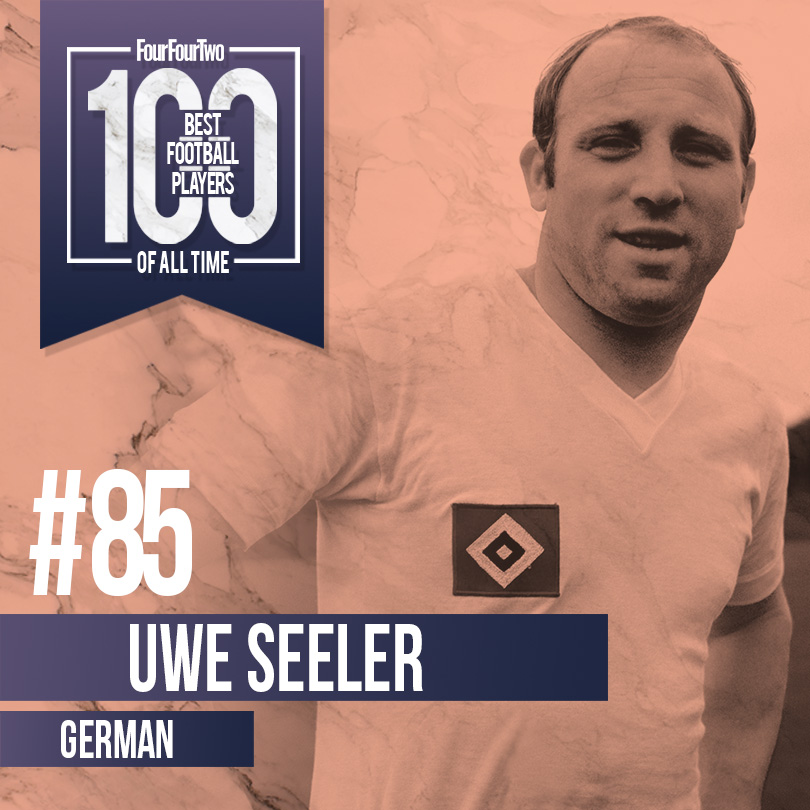
Why are they here?
Talk about starting as you mean to go on. When Seeler made his debut as an 18-year-old in 1954, he scored four goals. Over the next 19 years, he never stopped plundering them for West Germany across three World Cups, and for his beloved Hamburg, with whom he netted 404 goals in 476 games.
Although only 5ft 7in, he was incredibly powerful, and blessed with a prodigious leap which enabled him to score numerous headers throughout his career.
Career highlight
Not as decorated as some other West German legends, but Seeler did win the championship with Hamburg in 1959/60, netting over 50 goals for the season.
Words: Jon Spurling
84. Giacinto Facchetti
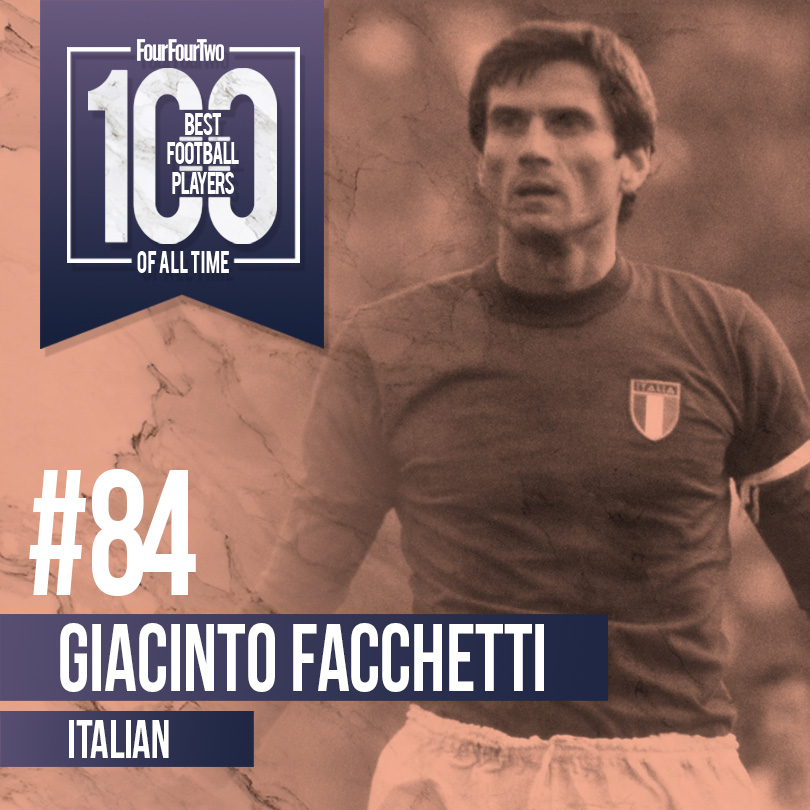
Why are they here?
In the 1970 World Cup Final, Brazil saw the future. He was playing at left-back for the opposition, who O Canarinho were busy beating 4-1 at the time.
Italy’s Giacinto Facchetti invented the modern full-back. Converted by Inter coach Helenio Herrera from a centre-forward into a right-footed left-back, Facchetti provided the deep-lying attacking thrust in a defence-first catenaccio system which dominated Italian football from the mid-1960s for three decades.
“Those who copied me copied me wrongly,” Herrera later said of his Inter side. “I had Picchi as a sweeper, yes, but I also had Facchetti, the first full-back to score as many goals as a forward.”
In an 18-season career comprising 629 Nerazzurri appearances and 75 goals, Facchetti won four Serie A titles, two European Cups, two Intercontinental Cups and Euro 68 with Italy. Forget Carlos Alberto, Roberto Carlos or any other buccaneering Brazilian: this is where the full-back as a weapon began.
Career highlight
Being part of the first Italian side to defend the European Cup in 1965.
Words: Andy Murray
83. Ryan Giggs
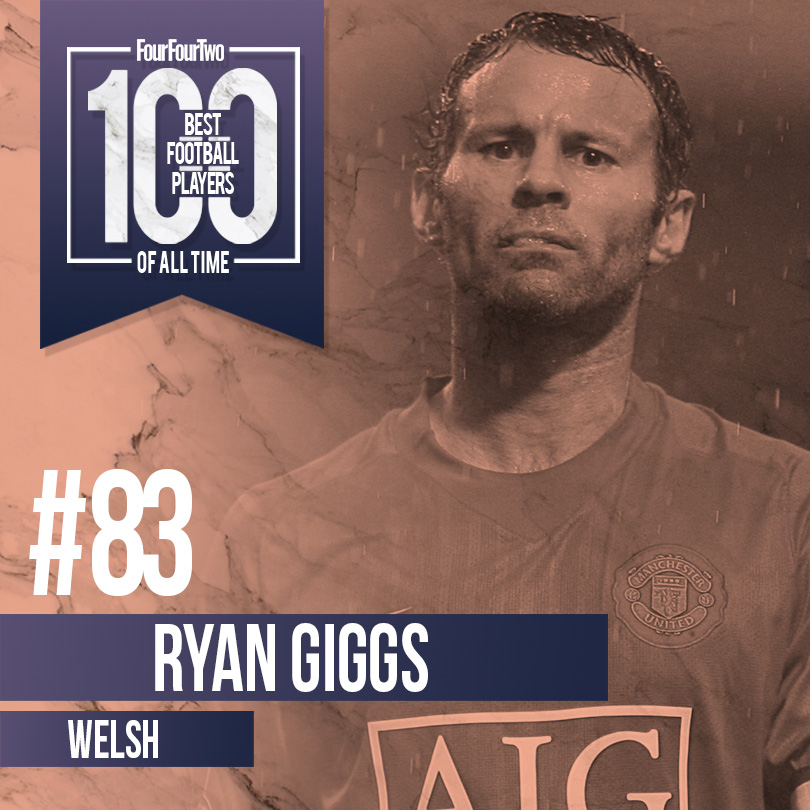
Why are they here?
Evergreen Welsh winger who spent over two decades flowing elegantly past full-backs in the English league and in Europe. Giggs spent his entire career at Manchester United, making a club-record 963 appearances and picking up 13 league titles along the way.
As he grew older and his pace began to wane, he was successfully repurposed by Sir Alex Ferguson into a number of different midfield roles – testament to his flexibility but also fundamental to his lifespan at the top of the game. A true modern great and perhaps the first Premier League superstar, Giggs thrilled for longer than he had any right to.
Career highlight
That treble with Manchester United, winning the Premier League, FA Cup, and Champions League in the 1998/99 season.
Words: Seb Stafford-Bloor
82. Hugo Sanchez
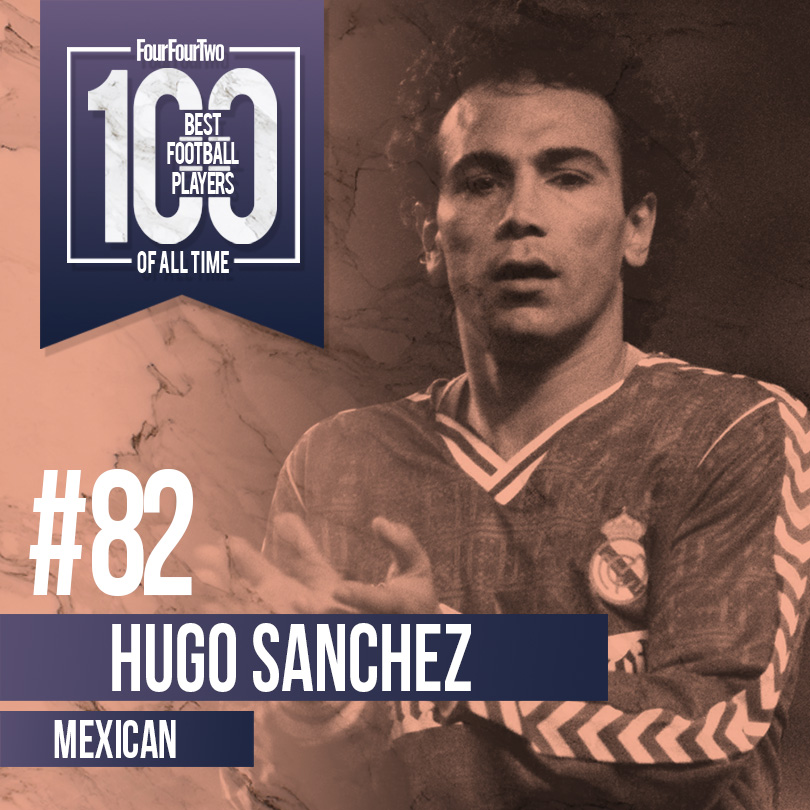
Why are they here?
Comfortably the finest Mexican player of all time and one of the leading scorers in Real Madrid and La Liga history. He played for both Madrid clubs, but it was at Real (after moving in 1985) where Sanchez and his somersaulting goal celebration became legend.
Sanchez won five consecutive league titles between 1985 and 1990, was the competition’s top scorer in four of those seasons, and decorated Spanish grounds all over the country with his spectacular range of finishes. Predatory inside the penalty box, certainly, but also extravagantly gifted outside of it, too.
Career highlight
1989: a Liga winner’s medal, victory in the Copa del Rey final against Real Valladolid and, after a staggering 45 goals in 42 games across all competitions, the European Golden Boot.
Words: Seb Stafford-Bloor
81. Dragan Dzajic
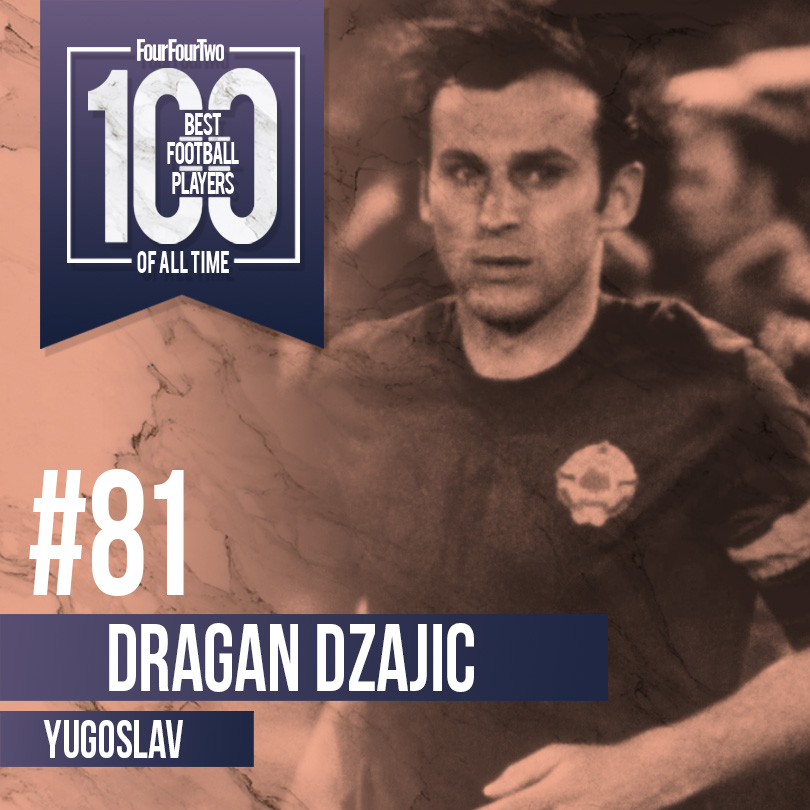
Why are they here?
Dzajic only used his right foot for running, but his left foot was absolutely amazing. Playing on the wing, he was able to dribble past any defender, his crosses were immaculate, and his free-kicks could be magical.
He helped Red Star Belgrade to win five league championships between 1963 and 1973, and was at the very heart of the Yugoslavia national team for 14 years. It’s a great shame that Dzajic was only allowed to move abroad at the age of 29, and went on to represent modest Bastia in France.
Career highlight
Dzajic scored the opening goal of the 1968 European Championship Final against Italy and was close to leading Yugoslavia to the title, but for a late Italian equaliser.
Words: Michael Yokhin
The list
100 to 91 • 90 to 81 • 80 to 71 • 70 to 61 • 60 to 51 • 50 to 41 • 40 to 31 • 30 to 21
20 • 19 • 18 • 17 • 16 • 15 • 14 • 13 • 12 • 11 • 10 • 9 • 8 • 7 • 6 • 5 • 4 • 3 • 2 • 1
Alex Reid is a freelance journalist and the former digital features editor at FourFourTwo. He has also written for the Guardian, talkSPORT, Boxing News and Sport magazine. Like most Londoners, he is a lifelong supporter of Aberdeen FC. He is deceptively bad in the air for a big man. He has never been a cage fighter.

